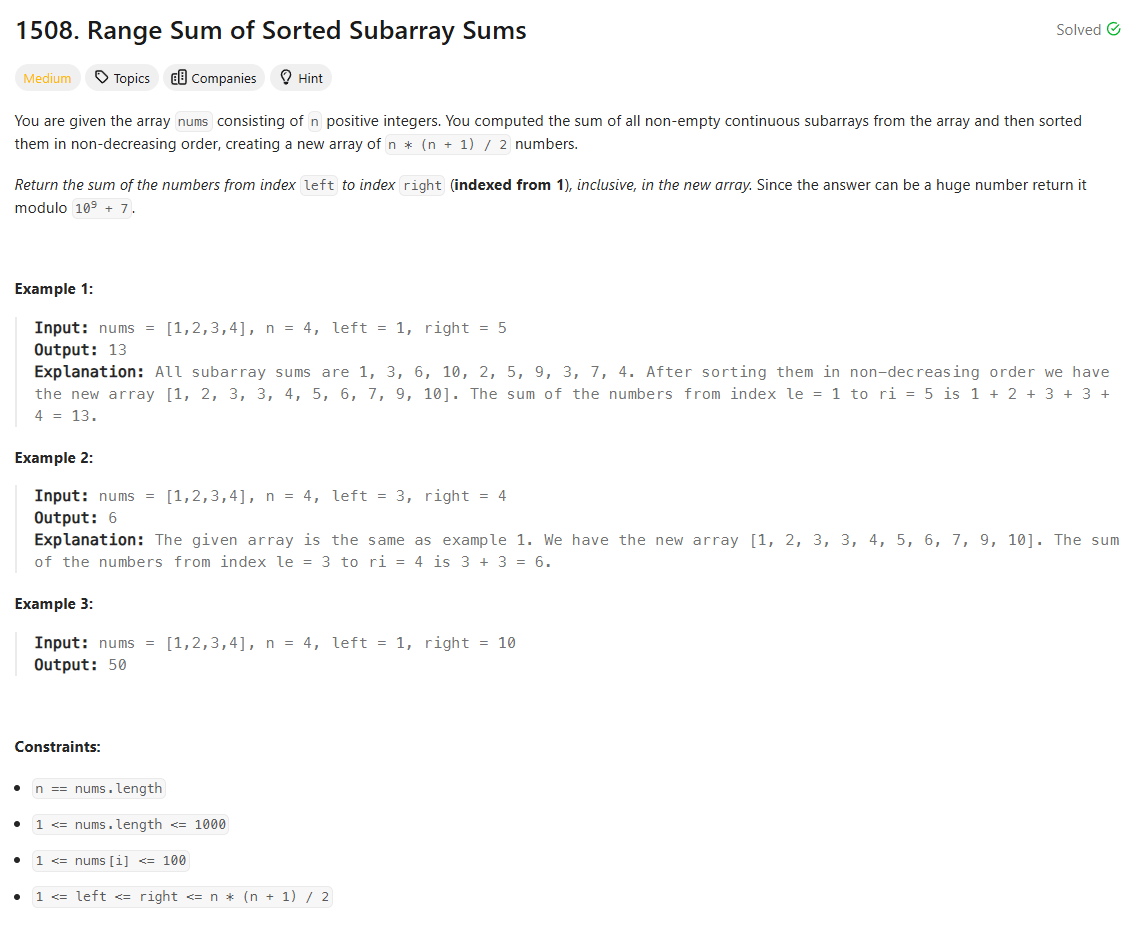Problem of The Day: Range Sum of Sorted Subarray Sums
Problem Statement

Intuition
To find the sum of a specific range of subarray sums, we can first generate all possible subarray sums, sort them, and then sum the desired range.
Approach
- Generate Subarray Sums: Iterate through the array and calculate the sum of all subarrays.
- Sort the Sums: Sort the list of subarray sums to make it easy to access the required range.
- Sum the Desired Range: Sum the elements from the
leftindex to therightindex in the sorted list of subarray sums.
Complexity
- Time Complexity:
- Generating all subarray sums takes (O(n^2)) time since there are (\frac{n(n+1)}{2}) subarrays.
- Sorting the subarray sums takes (O(n^2 \log n)).
- Summing a range of the sorted array is (O(right - left + 1)), which is (O(n^2)) in the worst case.
- Overall time complexity: (O(n^2 \log n)).
- Space Complexity:
- Storing all subarray sums requires (O(n^2)) space.
- Overall space complexity: (O(n^2)).
Code
from typing import List
class Solution:
def rangeSum(self, nums: List[int], n: int, left: int, right: int) -> int:
sub_arr = []
MOD = 10**9 + 7
for i in range(n):
curr_sum = 0
for j in range(i, n):
curr_sum += nums[j]
sub_arr.append(curr_sum)
sub_arr_sorted = sorted(sub_arr)
return sum(sub_arr_sorted[left-1:right]) % MOD
Editorial
Approach 2: Priority Queue
class Solution:
import heapq
def rangeSum(self, nums, n, left, right):
pq = []
for i in range(n):
heapq.heappush(pq, (nums[i], i))
ans = 0
mod = 1e9 + 7
for i in range(1, right + 1):
p = heapq.heappop(pq)
# If the current index is greater than or equal to left, add the
# value to the answer.
if i >= left:
ans = (ans + p[0]) % mod
# If index is less than the last index, increment it and add its
# value to the first pair value.
if p[1] < n - 1:
p = (p[0] + nums[p[1] + 1], p[1] + 1)
heapq.heappush(pq, p)
return int(ans)
- time: O(n^2 * logn)
- space: O(n)
Approach 3: Binary Search and Sliding Window
class Solution:
def rangeSum(self, nums, n, left, right):
mod = 10**9 + 7
def count_and_sum(nums, n, target):
count = 0
current_sum = 0
total_sum = 0
window_sum = 0
i = 0
for j in range(n):
current_sum += nums[j]
window_sum += nums[j] * (j - i + 1)
while current_sum > target:
window_sum -= current_sum
current_sum -= nums[i]
i += 1
count += j - i + 1
total_sum += window_sum
return count, total_sum
def sum_of_first_k(nums, n, k):
min_sum = min(nums)
max_sum = sum(nums)
left = min_sum
right = max_sum
while left <= right:
mid = left + (right - left) // 2
if count_and_sum(nums, n, mid)[0] >= k:
right = mid - 1
else:
left = mid + 1
count, total_sum = count_and_sum(nums, n, left)
# There can be more subarrays with the same sum of left.
return total_sum - left * (count - k)
result = (
sum_of_first_k(nums, n, right) - sum_of_first_k(nums, n, left - 1)
) % mod
# Ensure non-negative result
return (result + mod) % mod
- time: O(n log sum) where
nis the the size andsumis the total sum of the sums array - space: O(1)